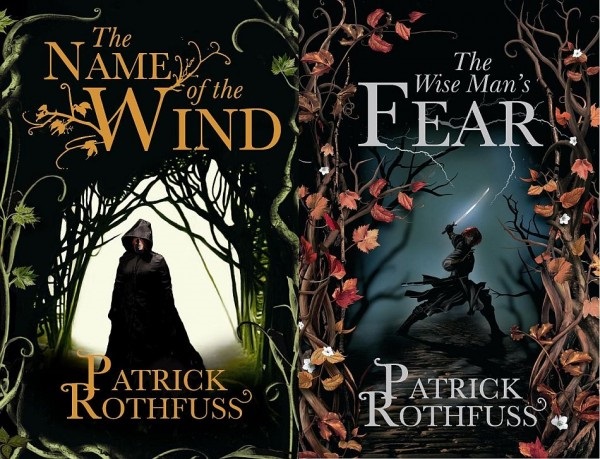So a couple of years ago, a friend recommended that I read “The Kingkiller Chronicle”. So I did what anybody would do in that situation, I went out and got myself a copy of the first book, “Name of the Wind”. Like any book I read, I started off by slowly by limiting myself to a chapter a day. However, as happens somewhat frequently to me, the book quickly wore down my resolve and I finished it in just a few weeks. Naturally, when I find something I like, my first instinct is to try and share it with other people. The first people I thought of were my brothers.
Since childhood, my brothers and I have always been close. It is a bond forged in long hours spent together, both in the crucible that was the room we shared and in the tighter quarters of my dad’s van on the road whenever our family went on our yearly vacation. We developed similar tastes and interests, and our close friendship means a lot to me. Now, out of my brothers and me, I am the most voracious reader. I’ve slowed down quite a bit since my school days, but I still occasionally like to spend a few hours curled up with a good book. My youngest brother, Douglas, never really got into reading for pleasure.
In fact, it got to a point where it became a running joke among my brothers that, despite holding a doctorate, Doug never learned to read. This left only my middle brother, Jonathan to share the series with. To make a long story short, I lent him my copy of the book for a long flight and, despite the fact that he enjoyed what he read, he’s still only a little bit over half way through the first book almost a year later. Jonathan and I have read books together in the past.
We both read Terry Goodkind’s “Sword of Truth” series at almost the same time 10 years ago, though I remember he was ahead of me at first and I chafed at being stuck behind him until he agreed to let me read ahead. Nowadays, I’m not sure what he does with his time, but he hasn’t spent that much of it keeping up with our various fandoms. He’s dropped all but a few TV shows (I’m not sure he watches anything besides This is Us and A Million Little Things). In the Marvel Netflix shows, which he pays for, he’s still on the second season of Daredevil.
There are a number of reasons why I think that he, or anyone really, would like the books. The main character in the series is Kvothe (pronounced like quoth). In a peculiar way, the story starts at the end, with our hero, now a grizzled barkeep in hiding under the name “Kote”. His identity is however discovered by a traveling scrivener who calls himself Chronicler, and he agrees to tell the tale of his life to him over the course of the next three days. Each book covers a day of Kvothe’s storytelling, with the second released in 2011 and the third has yet to be released. The story is every bit as well-plotted as “Game of Thrones”, but as much as I loved that novel, this one is better written.
Rothfuss has a way of painting a picture with words that is at once as flowery as it is descriptive. The one complaint I have about the series is that thus far it feels like too much has gone Kvothe’s way, though there is much to suggest this will change by the end of the series. Ominous whispering in the first chapter suggests that Kvothe is either about to or waiting to die. It’s also telegraphed early on that Kvothe will both kill a king (as the series title suggests) and get thrown out of the University. The other thing to remember is that Kvothe himself admitted that he exaggerated and helped spread many of the rumors about himself.
Generally, I find Kvothe to be an agreeable sort of person. He’s very intelligent and his clever solutions to problems are often very entertaining. He generally seems like a likable person, although he can be very stubborn and he does also have a dark side. He has the courtesy to admit when he was wrong and generally seems to be truthful in his relation of event even when things make him look bad. The books have a nice mix of problems that run the gamut between truly heroic adventures and more mundane people problems.
Lastly, as a scientist, I deeply appreciate the thought and attention to detail that was put into the magic system. Many series, like “Harry Potter” or “Lord of the Rings” don’t bother to explain how magic works. While they provide a clear indication of some things magic can’t do (raise the dead is normally impossible), there’s never any clear limits to magic in general. The magic system in “Kingkiller” is clear and distinctly limited. The most basic magic is called Sympathy and it involves creating a voodoo-like connection between two objects. This magic cannot create energy, however, so while you can do a lot with this, its utility is limited. If you wanted to levitate a coin, for instance, you could create a link between it and another coin.
After that lifting one coin causes the other to lift as well. Lifting that coin would feel like it’s heavier than the two coins combined because that’s where all the energy of the connection comes from. The connection is also stronger or weaker depending on how alike the two objects are, so if one coin was metal and one coin was wood it would take much more force to move the coins with sympathy. Kvothe is quite adept at sympathy and becomes the most powerful person in his class. Artificing, and Alchemy are two other minor disciplines in the books.
Alchemy is like a magical form of chemistry, so Kvothe’s general distain for it causes me some dismay as a trained chemist. Artificing is using Sympathy in combination with glyphs to produce a magical object. The last magical art is called Naming and it is the most powerful. The basic idea is that if you know something’s true name you can control it. Naming is very difficult to master and most Arcanists trained in magic can only master one or two, though Kvothe is said to have mastered many. It is seeing his first teacher call the name of the wind that gets Kvothe first interested in magic. Kvothe calls Naming “real magic” and he struggles to learn its power which doesn’t seem to be able to really be taught.
I really liked both novels and would kind of like to reread them before the third one comes out, which brings me back to my brother. Perhaps writing this article can persuade him to finish it. If not, I suppose, given how long it’s been already, I’ll have plenty of time before the next one comes out.
Justin Hartline has a degree in Chemistry and puts his science knowledge to use as an investigator at a liquid coating company. His Dorky credentials include a love of Science Fiction (especially Star Wars), Fantasy (especially Game of Thrones), and superhero (especially Marvel) genres. He’s also a big fan of Nintendo games!
Contact: Twitter




